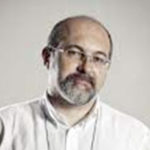Monday, 13 September 2021
All times are CEST
Special session: Designscapes and the EIT KIC on Culture and Creativity
Speakers meeting link: https://bit.ly/36uVRwF | Meeting attendants: Facebook live at https://www.facebook.com/designscapesproject/
- 10:00-10:05 Welcome and Introduction
Francesco Molinari, ANCI Toscana - 10:05-10:25 Culture and Creativity after the Pandemic
Pierluigi Sacco, OECD/Harvard University - 10:25-10:35 Q&A
10:35-10:55 Capacity Building for Design enabled Innovation
Ingrid Mulder, TU Delft - 10:55-11:05 Q&A
- 11:05-11:25 Communities of Design enabled Innovation
Kerstin Junge, Tavistock Institute - 11:25-11:35 Q&A
- 11:35-12:00 Conclusions and way forward
David Crombie, HKU Utrecht - 12:00 End
Our speakers

Pier Luigi Sacco, PhD, is Senior Advisor to the OECD Center for Entrepreneurship, SMEs, Regions, and Cities, Associate Researcher at CNR-ISPC, Naples, and Professor of Cultural Economics, IULM University Milan. He is also Senior Researcher at the metaLAB (at) Harvard and at the Bruno Kessler Foundation, Trento. He has been Visiting Professor, Visiting Scholar and Faculty Associate at the Berkman-Klein Center for Internet and Society, Harvard University, and Special Adviser of the EU Commissioner to Education, Culture, Youth and Sport.

Ingrid Mulder, PhD is an expert in transformative and social design. Her background in policy and organization sciences (MA, University of Tilburg) and behavior science (Ph.D., University of Twente) together with an early-stage research career anticipating future technologies impacting society within the national Top Technology Institute on Telematics has reinforced her ongoing transdisciplinary research addressing complex societal challenges at a systemic level. She has been (co-)principal investigator in a dozen of national and European projects, that share their focus on design methodology in relation to digital, social or urban innovation and established among others the European Network of Living Labs and the Designscapes capacity building program. Currently, as an Associate Professor at Delft University of Technology and director of the Delft Design Lab Participatory City Making, she further builds design capacity in the public realm through local design experiments and developing methods and strategies for social sustainability and systemic change.

Kerstin Junge is a principal researcher and consultant at the Tavistock Institute of Human Relations (TIHR), specialising in the evaluation of social innovations in particular in the areas of employment and social inclusion at local, national and European levels. Her work focuses on researching and evaluating large scale and complex interventions using socio-technical approaches to solve complex challenges. Kerstin holds a PhD in European Politics and a Postgraduate Certificate in Organisational Consulting and Change, is a member of the UK and European Evaluation Societies as well as the Alliance for Useful Evidence.

David Crombie has been involved in European research and innovation projects since FP4 with a focus on human-centered strategic design issues and crossover innovation trajectories. Based in the HKU University of the Arts Utrecht, in 2011 he authored a pan European study on the Entrepreneurial Dimension of the Cultural and Creative Industries for EACEA and this informed the policy discussions for the H2020 programme for supporting the creative industry sector. He is currently working on research approaches for the Horizon Europe global challenge on Inclusive & Creative Society, the Green Deal and the NEB. He participates in the OECD working group on Critical Thinking & Creativity, the ERRIN WG on Design & Creativity, is an ambassador for the European Network of Living Labs (ENoLL) and has a keen interest in Anticipatory Innovation Governance and Collective Intelligence Design https://anticipate.network.
The Designscapes consortium led by ANCI Toscana has successfully managed to create, develop and interact remotely with a community of 99 winners of a cascade funding call launched during 2018-2020 across three consecutive rounds, and that saw the participation of 475 applicants from the public and private sectors in the majority of European countries. These have proposed a wide variety of innovative ideas to tackle wicked societal problems at urban level and have delivered design enabled prototypes of products, services, business models, training methods and even local policies, bringing some of them very close to scalability in the market of reference. The average grant received to do all this ranged between 5,000 and 25,000 Euros (on average 15,000 given the call budget of 1.5 million Euros).
Despite the hit of the pandemic, which nevertheless added new and unexpected angles to the remote interaction with call winners, based on a mix of financial support and technical assistance (including training and capacity building on design methods and tools) all 99 pilot projects have been finalised successfully and about 20% of them presented themselves, during the months of July and August 2021, in previous online sessions of this “un conference”, which were broadcasted live and can still be accessed at our official page – https://www.facebook.com/designscapesproject/
In this workshop we would like to reflect openly on the main take-aways of the Designscapes experience – what went right and wrong – and especially on the conditions for embedding this community into (or at least making it interoperable with) the forthcoming KIC on Cultural and Creative Industries that the European Institute of Technology is going to launch in November this year.
